Installation Prerequisites
Windows Installation Prerequisites for Agent
In your assessment, as soon as you log into the console portal, you can download the Windows installer file from the Setup -> Agent Setup tab through the Discover tab highlighted below from the home page. You can download the MSI file or copy the command to be run from an elevated command prompt. The command line pictured below shows options for a proxy server with authentication required. These options are also available in the MSI file, but are not required to install the agent.
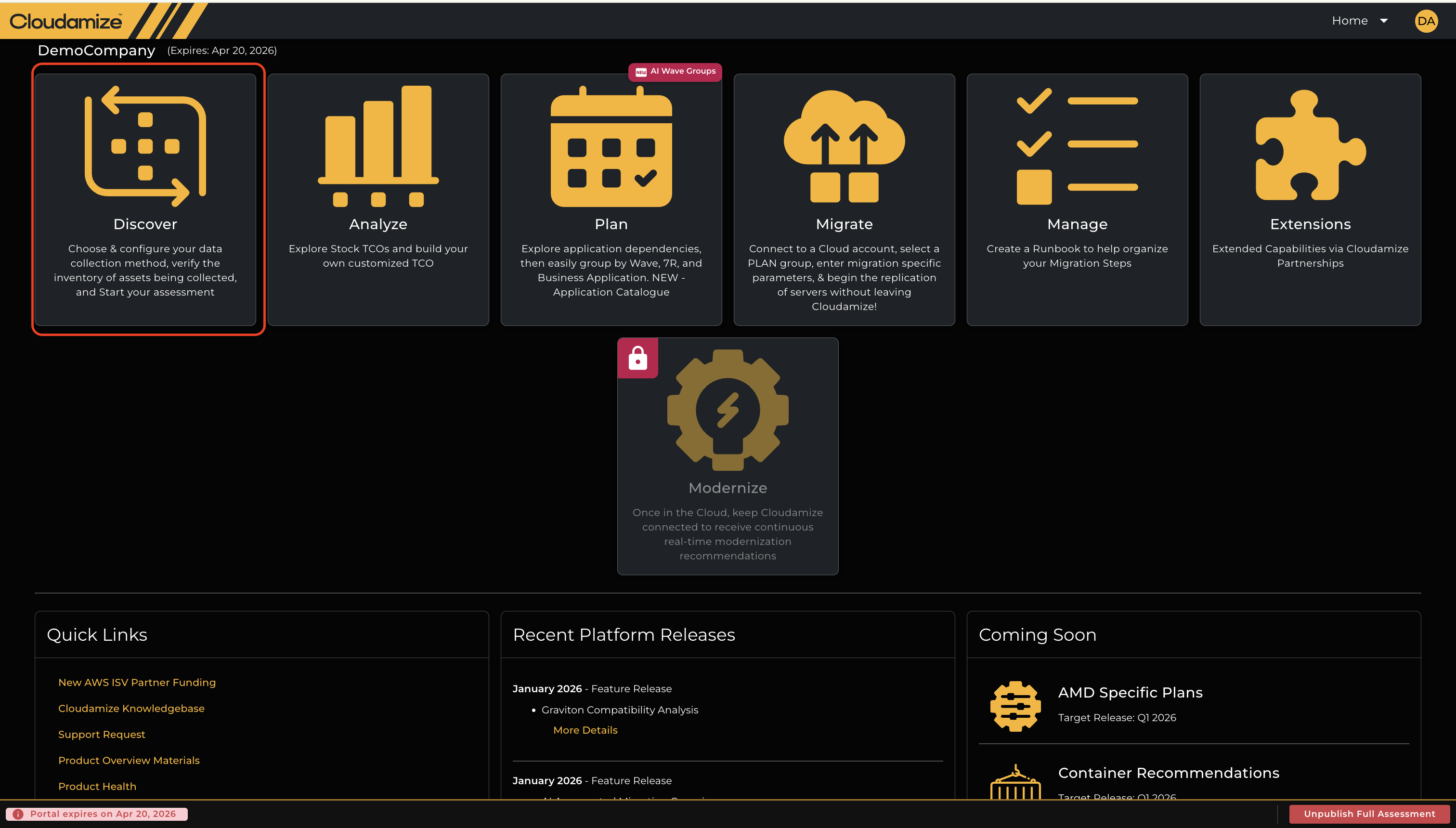
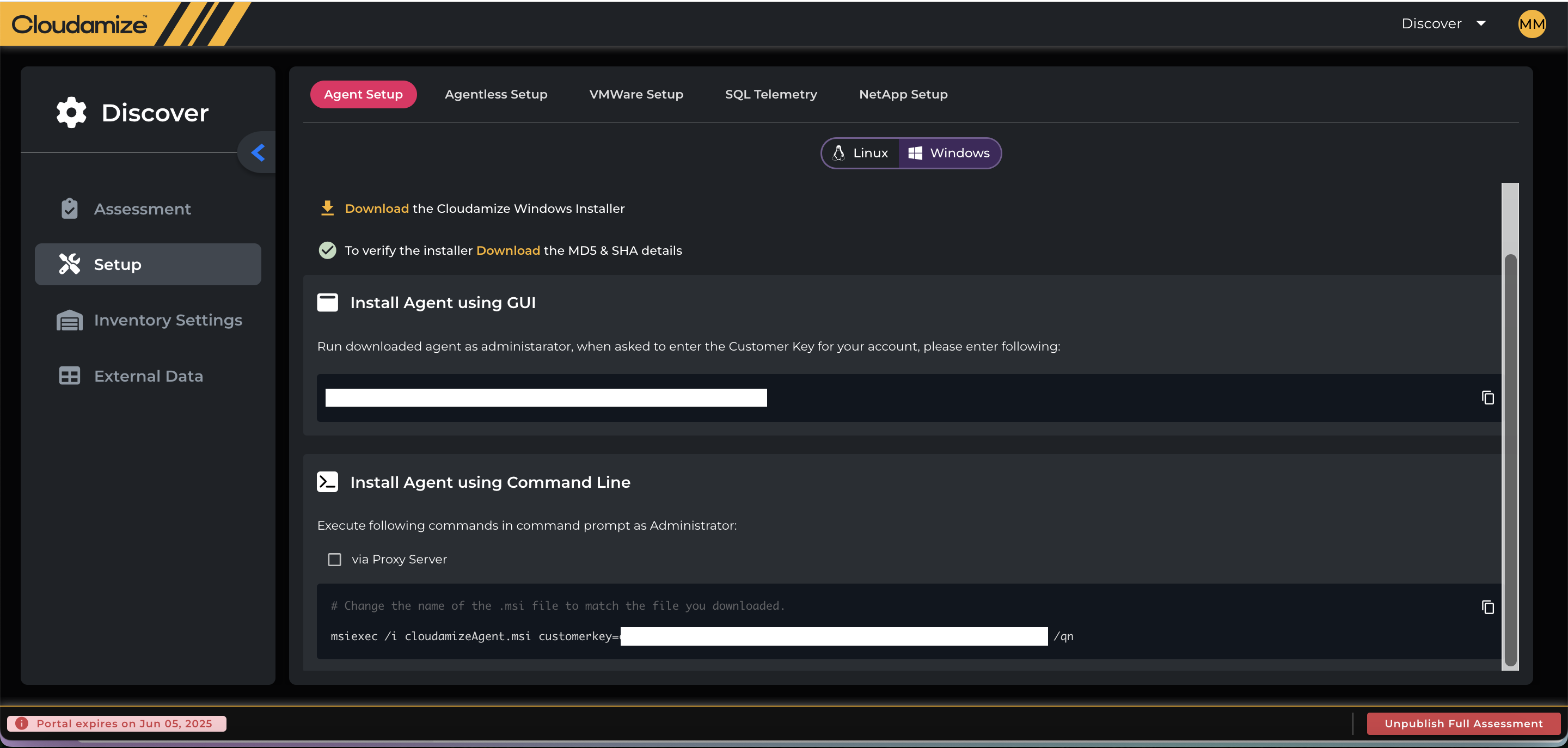
Access to our servers at am.cloudamize.com for US infrastructure, am-de.cloudamize.com for EU infrastructure, or am-ae.cloudamize.com for UAE infrastructure over port 443 directly or through a corporate proxy.
If your system locally caches DNS resolution, you may need to resolve am.cloudamize.com to 35.171.170.26 / 52.206.224.238 or am-de.cloudamize.com to 18.194.12.63 to allow egress traffic. This feature is not currently available for our UAE region.
32 or 64-bit Windows Server 2012 or higher (https://support.cloudamize.com/kb/supported-operating-systems-and-chipsets)
.NET Framework version 3.5 or above
4 CPU cores
4 GB RAM
2 GB persistent storage
Windows installation and troubleshooting Procedures can be found here:https://support.cloudamize.com/kb/installation-troubleshooting.
Linux Installation Prerequisites for Agent
You can access the Linux installer command and Customer Key in your assessment from the Setup → Agent Setup tab through the Discover tab on the home page.
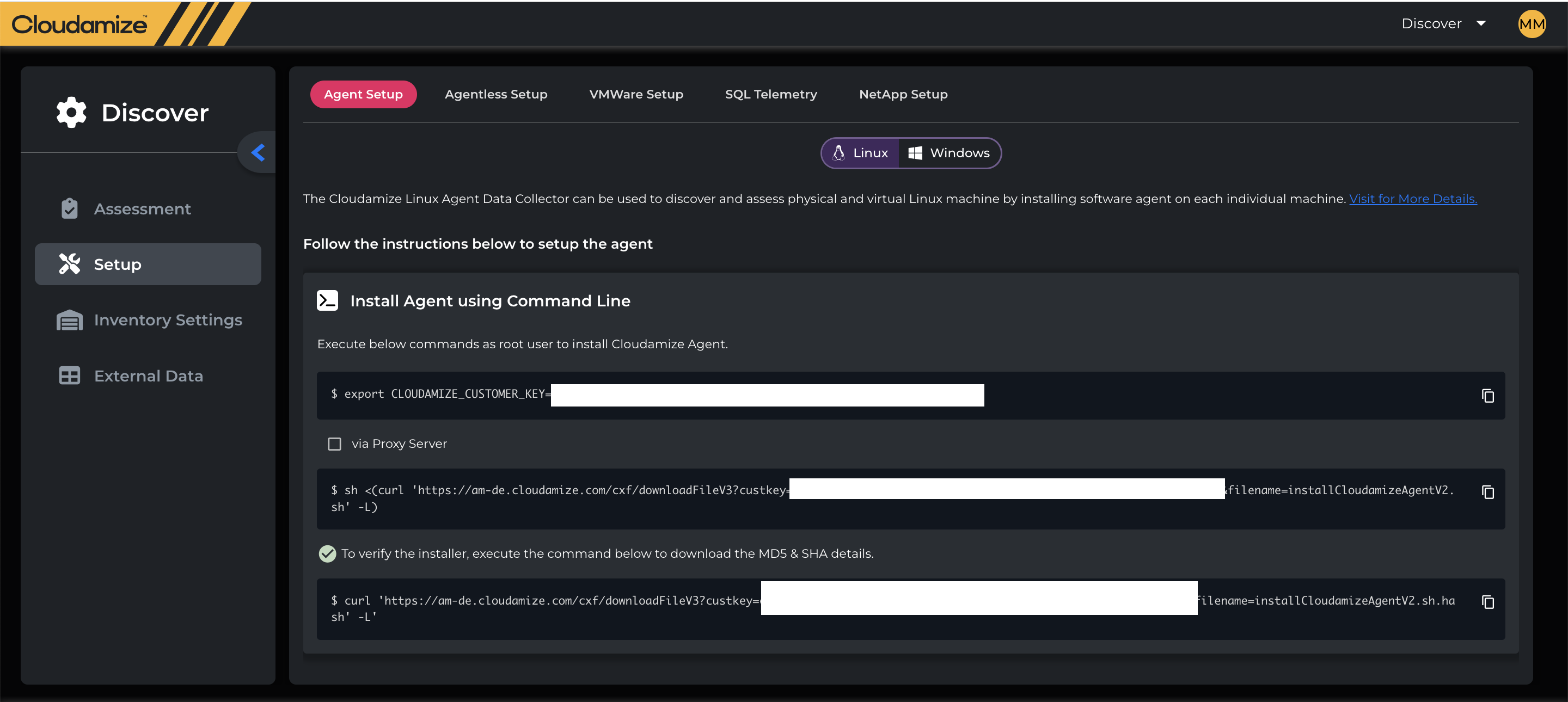
The Install script requires wget to retrieve content and curl to test/verify access to our data collection servers at am.cloudamize.com for US infrastructure, am-de.cloudamize.com for EU infrastructure, or am-ae.cloudamize.com for UAE infrastructure over port 443, either directly or through a corporate proxy.
If your system locally caches DNS resolution, you may need to resolve am.cloudamize.com to 35.171.170.26 or am-de.cloudamize.com to 18.194.12.63 to allow egress traffic. This feature is currently not available for our UAE region.
Root and/or wheel access
One of the following OSes:
Red Hat Enterprise Linux Server release 7.0 or higher
Oracle Linux 6.5 or higher
Ubuntu 16.04 or higher
CentOS release 7 or higher
Debian GNU/Linux 8.0 or higher
Amazon Linux AMI release 2013.03 or higher
Fedora release 12 or higher
Suse Linux 11 or higher
A supported version of OpenSSL.
The Cloudamize Agent can be installed on RHEL 7.0 or higher systems that have OpenSSL version 1.0.2k and are capable of handling the TLS 1.2 secure communication protocol.
350 MB persistent storage.
The Cloudamize Linux Agent requires 3% of CPU and 5% of memory while running.
Linux installation and troubleshooting Procedures can be found here.
Agentless Data Collector Prerequisites
The Cloudamize Agentless Data Collector (ADC) is a centralized, zero-footprint solution designed to discover and analyze your infrastructure without installing software on target nodes. By leveraging standard administrative protocols—WMI/RPC for Windows and SSH for Linux—the ADC remotely collects high-granularity performance metrics and application dependencies. Once gathered, this metadata is securely encrypted and transmitted via outbound HTTPS (Port 443) to the Cloudamize endpoints.
To access the Agentless Data Collector (ADC) MSI file, log in to your Cloudamize console and navigate to the Discover tab, then select Setup. From there, click on the Agentless Setup tab to find the download link for the installer package.
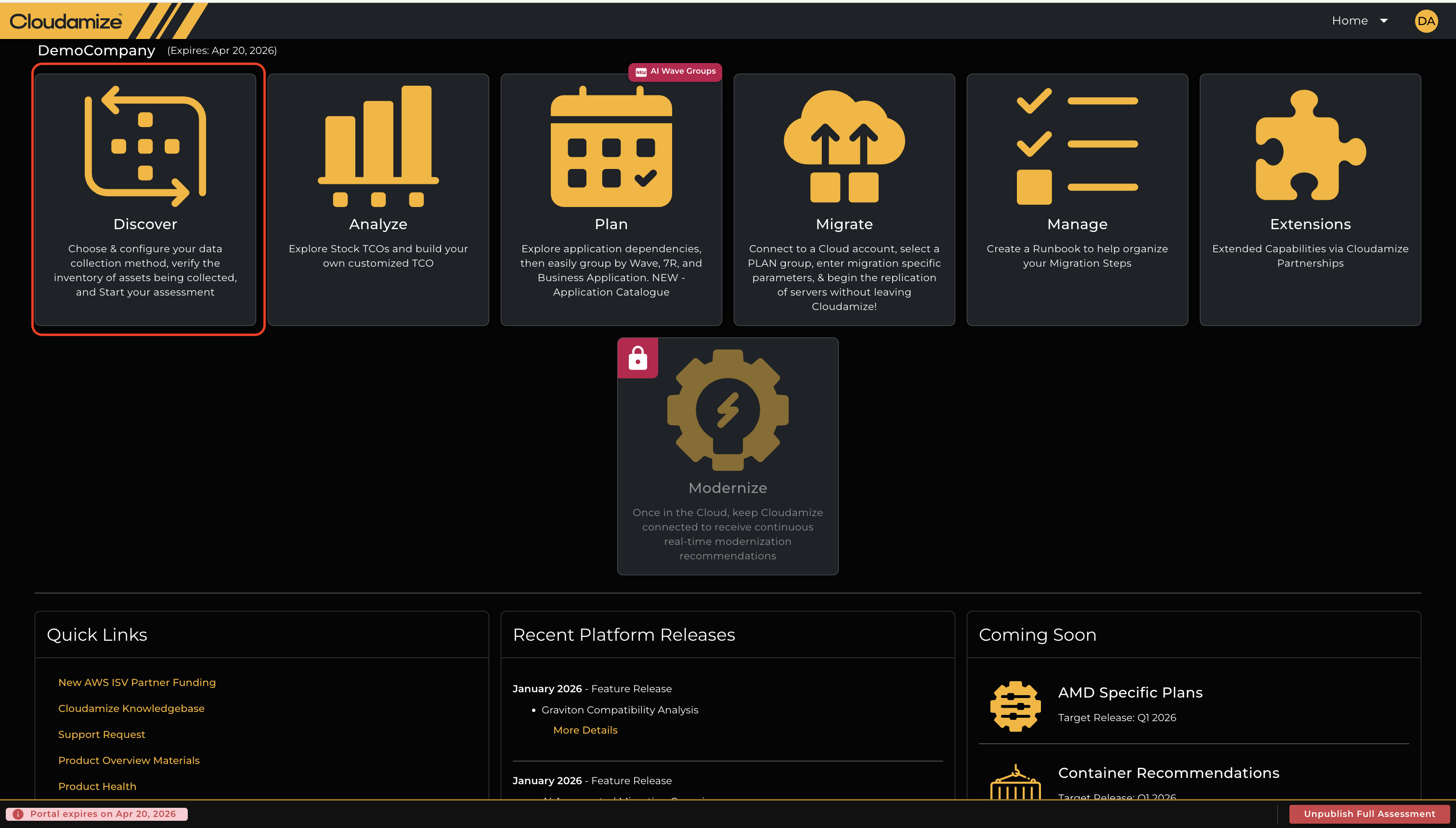
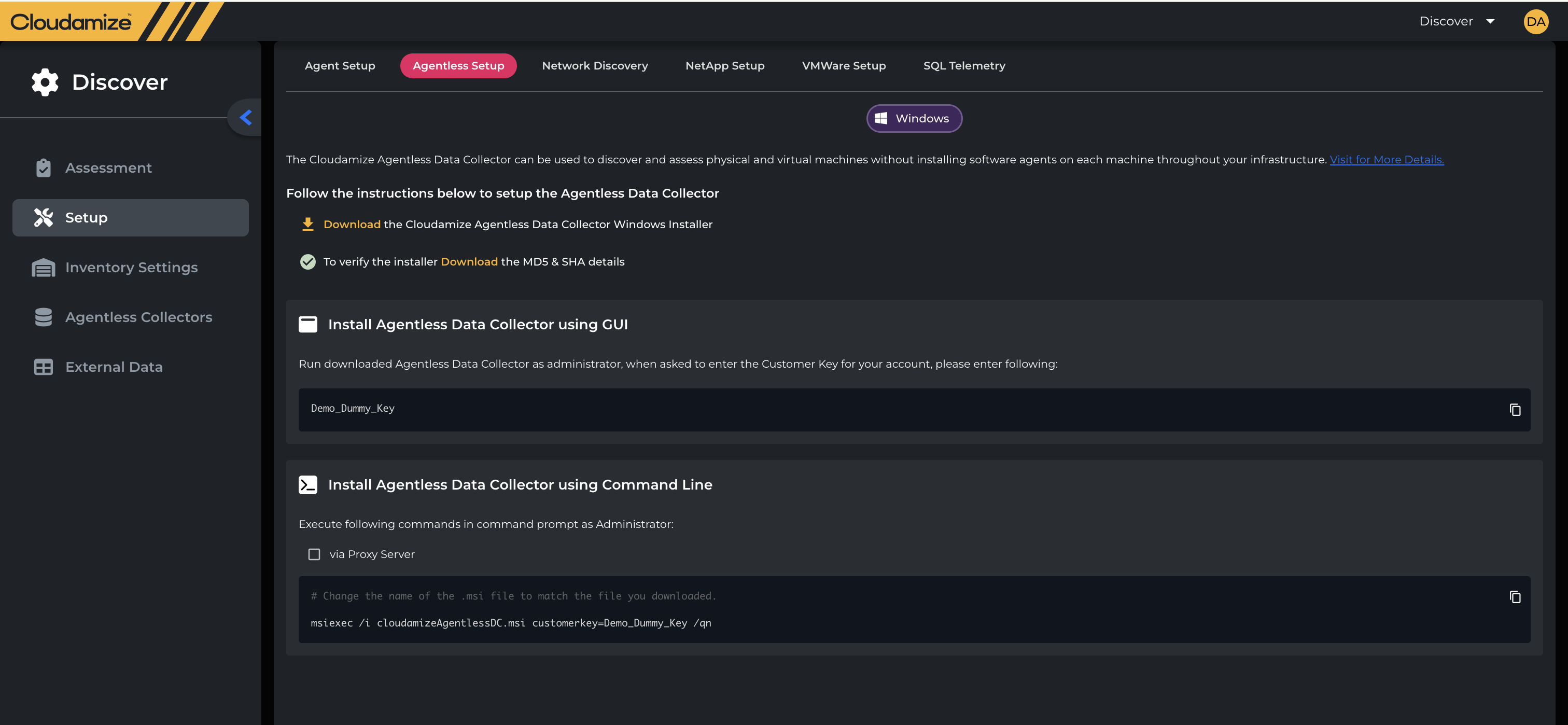
The table below lists the relevant ports for machine discovery and communication to the Cloudamize servers. Please note the following rules for each class of machine:
Machine with Cloudamize Agentless Data Collector installed:
TCP port 445 open inbound from remote Windows hosts added to Cloudamize Agentless Data Collector.
Access to our servers at am.cloudamize.com for US infrastructure, am-de.cloudamize.com for EU infrastructure, or am-ae.cloudamize.com for UAE infrastructure over port 443 directly or through a corporate proxy.
If your system locally caches DNS resolution, you may need to resolve am.cloudamize.com to 35.171.170.26 or am-de.cloudamize.com to 18.194.12.63 to allow egress traffic. This feature is not currently available for our UAE region.
Each Windows endpoint:
TCP port 445 open outbound to the machine with the Agentless Data Collector installed.
TCP ports 135 and the dynamic RPC port ranges open inbound, appropriate for your OS versions:
Windows Server 2008 and later: TCP ports 49152 to 65535 open inbound.
Windows Server 2003 and earlier: TCP ports 1025 to 5000 open inbound.
Each Linux endpoint:
TCP port 22 open inbound.
Protocol | Port | Usage |
TCP | 22 | SSH to access Linux servers |
TCP | 135 | Windows RPC |
TCP | 445 | Microsoft-DS Active Directory and SMB, Windows shares |
TCP | 1025-5000 | RPC dynamic port range for Windows Server 2003 and earlier |
TCP | 49152-65535 | RPC dynamic port range for Windows Server 2008 and later |
TCP | 443 | SSL to communicate with the Cloudamize servers |
Fig. 2 Ports relevant to the Cloudamize Agentless Data Collector
Authentication requirements for machines from an Agentless Data Collector
Windows machines require an account in the Administrators group (Domain Admin Account).
Linux machines require Root or Wheel access.
All other Windows and Linux system requirements apply.
The account should be set up with a static password (non-expiring password) for the desired data collection duration. This prevents the account from being locked out due to password expiration, which may result in authentication failure from the ADC to the target machine.
Note: If the password is not static, the customer must update the ADC UI with the new password every time the password is changed.
Minimum System Requirements for Agentless Installer
The Cloudamize Agentless Data Collector will need to be installed on a physical or virtual Windows machine, meeting the following minimum requirements:
64-bit Windows Server 2012 or higher
.NET Framework version 4.0
8 CPU cores
16 GB RAM
5 GB persistent storage
PowerShell v2.0 (if Basic SQL data is required)
PowerShell v5.1 or higher is required to collect Advanced SQL data (https://support.cloudamize.com/kb/basic-and-advanced-ms-sql-collected-by-agent-based)
Note: The agentless data collector runs obfuscated code, which is susceptible to AV quarantine. Both the agentless installer (CloudamizeAgentlessDc.exe) and the agentless watchdog (CloudamizeAgentlessDcWatchdog.exe) should be whitelisted or run on a VM without AV running, if possible.
vCenter Proxy Installation Prerequisites
64-bit Windows Server 2003 R2 or higher
.NET Framework version 4.0
4 CPU cores
5 GB RAM
2 GB persistent storage
Access to vCenter appliance over port SSL Port 443
Access to Cloudamize vCenter data collection server (52.202.114.20) using SSL over a supported port (default port 444, 80, or 22)
Note: No software is installed directly on vCenter. The only requirements are the requisite open ports for the Cloudamize Proxy or Cloudamize application to connect directly. A direct connection is only possible if a vCenter is on a public IP Address and internet-facing.
vCenter Installation, access tests, and troubleshooting documentation can be found here.
Supported Chipsets for all installation types
Intel Xeon
AMD Opteron
Pentium 4
Pentium D
Pentium M
Some Intel Core 2
